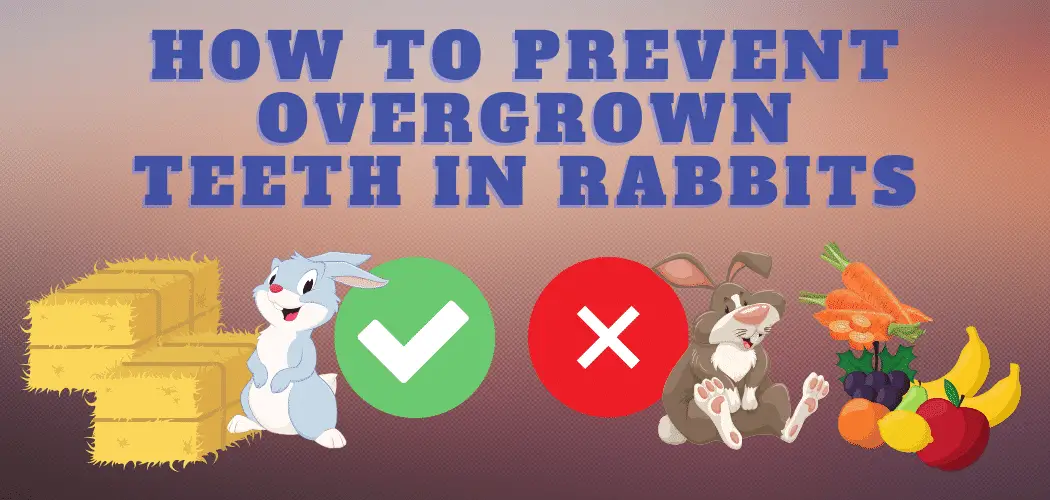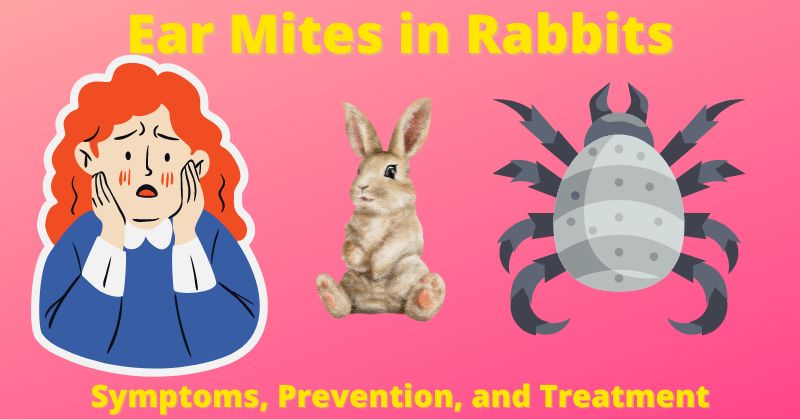Quick Answer: How to Prevent Overgrown Teeth in Rabbits
One of the most important things you can do to help prevent overgrown teeth in rabbits is to feed them a diet that’s rich in fiber. This means feeding them a diet of hay, grass, and leafy vegetables like kale. You should also avoid feeding them sugary treats, as these will only exacerbate the problem.
Long description of this topic below
Introduction – How to Prevent Overgrown Teeth in Rabbits
Bunnies are adorable little buck-toothed creatures. Their teeth never stop growing during the entire lifecycle.
Rabbits have a combination of ultra-sharp molars and incisors (both types keep growing throughout their life period). The dental anatomy eases their job of munching the coarse fiber-rich foods in the wild habitat. Eating roughage throughout the day has twin benefits:
- Regulate teeth trimming naturally
- Keeps the digestive system healthy
Teeth-wearing is necessary to keep buns healthy and happy. Pet rabbits are prone to develop overgrown teeth. It is a common medical condition known as malocclusions in indoor bunnies.
Overgrown rabbit teeth can be a major health concern causing the inability to eat and painful syndromes.
There are treatment and care options for bunnies with overgrown teeth. But, like all other illnesses, prevention is the best measure to keep your cutie safe, healthy, and happy.
For your help, we have provided a comprehensive guide on overgrown teeth in pet rabbits. The FAQs at the end of the post have answers and vital tips to resolve the problems related to overgrown rabbit teeth.
Oral Physiology and Anatomy in Rabbits – An Overview
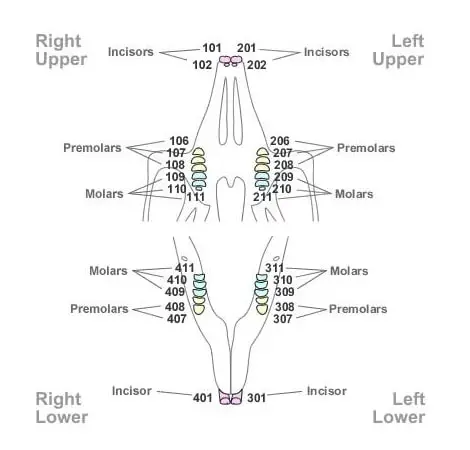
An understanding of their dental anatomy can be helpful to keep a watch on the little furry angel.
Periodical monitoring of their teeth can help to detect the overgrowing ones early.
A young bunny gets 16 deciduous teeth during the early days. With passing time, these teeth are substituted by 28 permanent teeth (as seen in adult rabbits).
Rabbits, like several other small pets, have an open-rooted dental structure. Their teeth can be categorized into the following types:
4 Maxillary Incisors:
The large buck teeth in the front are called maxillary incisors. The two small maxillary incisors are called peg teeth (behind the large ones).
2 Mandibular Incisors:
These structures are located at the back of the large maxillary incisors.
Incisors are sharp structures that cut the grass and other food particles into fine pieces.
22 Cheek Teeth:
The cheek teeth comprise premolars and molars that do not touch the incisors.
The cheek teeth are responsible for gnawing down the food particles into fine pulp for safety during swallowing.
What Causes Malocclusion (Overgrown Teeth) in Rabbits
Bunnies can develop overgrown teeth rapidly due to several reasons.
A low-fiber diet misaligned dental structure, and hereditary factors are commonly linked to malocclusion symptoms in indoor rabbits.
Improper Diet
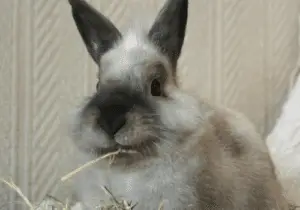
Are you feeding your cutie unlimited fiber-based food every day?
If your bun is diagnosed with overgrown teeth, this is the first question to identify the cause of the problem.
Bunnies are herbivorous creatures accustomed to eating a coarse fiber-rich diet in the forest. A pet bun must also eat similar food daily to trim down the teeth naturally.
Wild rabbits eat lots of fresh grass throughout the day. This is not possible to do for indoor small pets. The ideal substitute is hay. Natural hay has plenty of fiber and rough texture due to the microscopic silica outer layer.
Eating unlimited hay multiple times a day serves twin benefits. Chewing hay causes constant teeth wearing while promoting gut health.
Misaligned Teeth
Even a minor accident for tooth injury may cause teeth misalignment. In the urge to chew everything around, rabbits often bite stiff objects or try to pull things strenuously. Such instances go unnoticed, leading to injuries and cause misalignment of the oral structure.
Once out of the proper alignment, the upper and lower teeth do not grind each other.
Eating fiber-rich foods regularly does not help in teeth grinding buns with misaligned teeth problems.
Heredity
Sometimes rabbits may start developing overgrown teeth at an early age (less than 12 months). Often genetic factors are responsible for malocclusion in young bunnies.
Symptoms to Identify Overgrown Teeth in Rabbits
Overgrown teeth cause multiple health problems in rabbits. It can become severely painful. Buns with malocclusion may have difficulty in opening the mouth for eating food.
In some cases, the sharp and pointed long teeth may cut the tongue and cheeks from inside. Such internal injuries can cause mouth ulcers.
Keeping a watch on the symptoms can help to find out if your bunny has overgrown teeth. A sudden change in eating behavior is one of the early signs to identify the problem.
Depending on the intensity of the problem, rabbits with malocclusions may have the following symptoms:
- Unwillingness to eat food especially, hay
- Picks up food but drops it without eating
- Loss of appetite
- Rapid weight loss
- Salivating
- Watery eyes
- Swelling on the cheeks or chin
- Excessively long teeth
- Diarrhea
Tips to Prevent Overgrown Teeth in Rabbits
The best way to keep your cutie away from malocclusions is to adopt routine preventive care measures. Taking such steps from day one can help you to keep the little angel away from painful health issues.
Feed Unlimited Hay
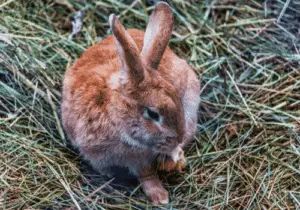
Hay must comprise 80% of the rabbit’s daily diet. Make sure your bun gets plenty of hay to keep chewing throughout the day.
Give pellets, fruits, and veggies in small quantities at times. These foods and treats are extremely delicious for rabbits. If you serve a bowl full of pellets, your bunny will finish the stuff soon and refuse to eat hay.
For more details on the rabbit diet, please visit our rabbit food page.
Various Types of Chew Toys
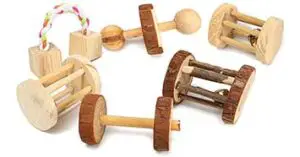
Chewing hay is often too monotonous for buns. Even if there is no problem, some picky pets refuse to eat hay.
Give them a break from the regular diet. Chew toys are the ideal boredom breakers for these creatures.
Bunnies love playthings around. They will tend to gnaw these items even while playing. As the name suggests, they are ideal for chewing.
Chew toys are made of rabbit-safe 100% natural untreated plant materials like coarse grass, hay, willow twigs, wood, etc. Chewing these items will also promote teeth grinding keeping your house rabbit healthy, happy, and active.
Check Your Rabbit’s Teeth Once a Week
To keep the guesswork at bay, it is better to check your bun’s teeth periodically. Make it a routine to check their teeth every weekend without a miss. It may not be a professional thorough checkup as performed by veterinarians. But still, it can work for you to find the problems before it becomes severe.
- Check the Incisors: You can gently lift their lips to monitor the front teeth for alignment. See if they have grown too large or curved.
- Gentle Cheek Massage: Gently rub around the cheeks to find any swelling or semi-hard bumpy structures. Abscesses or swelling are signs of mouth ulcers or internal injury. Overgrown teeth may cut the tissues on the cheeks while chewing food.
Monitor the Eating Habits
It is not possible to check the molars at home. Keep an eye on your small pet’s eating behavior. See if it is drooling, dropping food, or refuses to eat hay.
Annual Clinical Checkups
Visit the veterinarian with your indoor rabbit for a routine health checkup at least once a year. Vet physicians use medical tools to check your bun’s teeth structure. It helps them to locate misalignment problems, internal injuries, cheek teeth, etc.
Care Measures for Rabbits with Overgrown Teeth
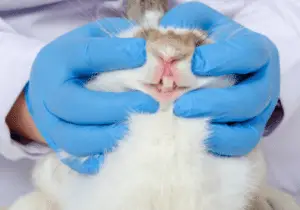
Once your bun has overgrown teeth, there is no use in feeding hay or providing chew toys.
These measures are best to prevent the teeth from overgrowing. Some care measures and treatments are need of the hour.
- Visit a Vet Clinic: If your rabbit has malocclusion, take it to the veterinarian at the earliest. Medical treatment is necessary to eradicate the problem and keep your bun healthy.
- Teeth Trimming/Removal: You should not attempt to trim down the bunny’s teeth at home. It is a clinical procedure involving permissible medical equipment, sedatives, anesthesia, etc. The veterinarian has hands-on experience in dealing with such issues.
- Liquid Diet: Rabbits with overgrown teeth cannot chew the food. You need to feed liquids with the help of a syringe during the recovery period.
For best care measures, please consult a veterinarian.
FAQ – Frequently Asked Questions
Why do my rabbit’s teeth keep growing?
Rabbits belong to the family of rodents. These small animals have a natural trait of continuously growing teeth.
They have a long gut and a sensitive digestive system. Eating unpolished fiber-rich foods and plenty of water is necessary to maintain good gut health.
The growing teeth help to chew coarse fiber easily. Chewing a lot of fibrous material causes teeth wearing. If the bunny teeth do not grow, regular eating will trim down the enamel completely.
How often do rabbits need teeth trimming?
There may be varying reasons your rabbit is developing overgrown teeth. Some species develop long teeth too frequently due to genetic factors. This is an unstoppable phenomenon, so your vet may recommend month trimming or tooth removal.
However, rabbits eating a healthy fiber diet may not require teeth trimming during the entire lifecycle.
Is fruit bad for rabbit teeth?
Giving fruits to bunnies is optional. Much like veggies, you need to introduce fruits slowly to a baby rabbit.
Note: Always remove the seeds before feeding fruits to rabbits.
Veterinarians recommend giving fruits 1-2 times a week. The permissible quantity per serving should include about 1 tablespoon per 5 pounds of body weight. Buns love to savor juicy fruits but should not eat them too much. Fruits safe for rabbits include:
- Apples
- Bananas
- Berries/ Cherries
- Watermelon
- Grapes
- Oranges
- Papaya
- Pineapple
- Peaches
- Plums
- Pears
What can rabbits chew on for healthy teeth?
Chewing is the best remedy for preventing malocclusion in rabbits. The chew items safe for rabbits include:
- Timothy hay
- Orchard hay
- Pinewood
- Apple twigs
- Willow branches
Conclusion
Malocclusion is a common problem in pet rabbits. A healthy fiber-based diet from an early age is beneficial to promote teeth-wearing in bunnies naturally.
Overgrown teeth in rabbits can be critically problematic for your cutie. Preventive measures are helpful to avoid severe complications. Regular monitoring should help you to detect overgrowth at an early stage.
However, if your bun shows changes in eating behavior or otherwise, schedule a health checkup with a veterinarian.
I hope this article has given you vital information about rabbit dental care and heath. Follow the preventive care measures to keep your bunny free of overgrown teeth trouble.
YouTube Video About How to Prevent Overgrown Teeth in Rabbits

Read more about this topic
Wikihow.com – Handle Overgrown Teeth in Rabbits
Pdsa.org.uk – Dental problems in rabbits

